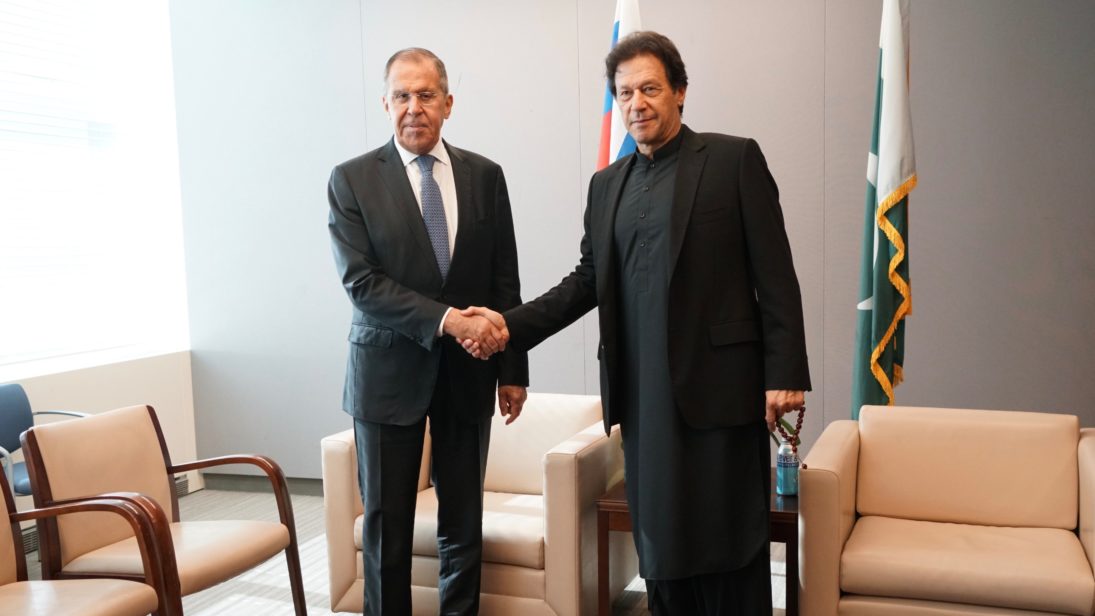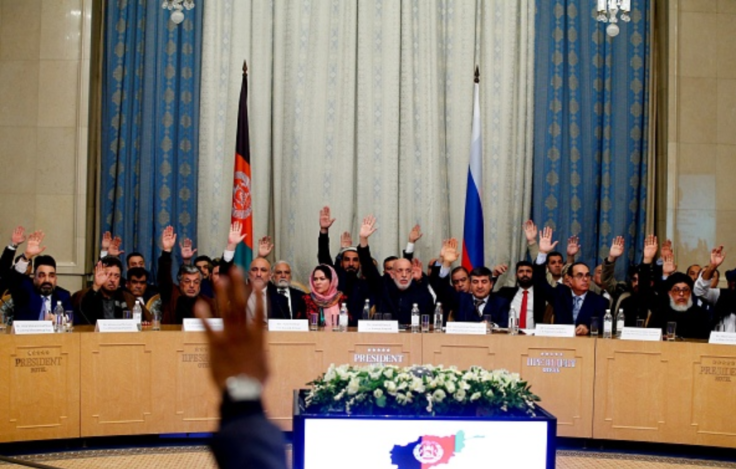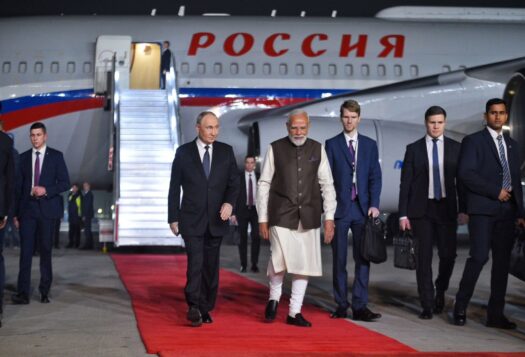
On the sidelines of last month’s United Nations General Assembly (UNGA) session, Russian and Pakistani foreign ministers hinted at transforming their burgeoning cooperation into a broader strategic partnership. Converging interests in Afghanistan have been a key factor in warming Russo-Pak relations. For Russia it is strategically important to minimize the spillover of terrorism into its periphery, which could impact potential Russian economic projects in Central Asia. Moscow has also proposed connecting the Eurasian Economic Union (EEU) with the Belt and Road Initiative (BRI), which might ensure its access to the warm waters of the Arabian Sea through Pakistan. For Pakistan, geographical necessity makes stability in Afghanistan critical both for security and economic interests, such as bolstering a workable environment for the China-Pakistan Economic Corridor (CPEC).
Russia and Pakistan have each been making efforts to mainstream the Taliban and counter Daesh’s regional affiliate, the Islamic State Khorasan Province (ISKP). Although the current impasse in the U.S.-Taliban negotiations presents a temporary setback, Russia and Pakistan have each actively pushed the United States to resume the peace process. Notably, the Afghan peace process serves as the main force behind improved Russo-Pak relations, and has previously been a source of cooperation between the United States, Pakistan, and Russia. Greater stability in Afghanistan could also help lead the Russo-Pak partnership from a narrow strategic area of cooperation (counterterrorism) to potential longer term regional cooperation.
Greater stability in Afghanistan could also help lead the Russo-Pak partnership from a narrow strategic area of cooperation (counterterrorism) to potential longer term regional cooperation.
Narrow Convergence: Counterterrorism Interests and U.S.-Taliban Negotiations
Russia has a long history of involvement in Afghanistan security, and shares Pakistan’s strategic interest of combating ISKP, making Russo-Pak cooperation on the Afghan peace process a natural development. Russia and Pakistan have each made efforts to mainstream the Taliban. Islamabad has long encouraged political talks with the Taliban, which, if in power, would help Pakistan’s geostrategic interests in the region. Russia’s recognition of the Taliban has endorsed Pakistan’s stance. Additionally, establishing its own role in the peace process has helped its image as a power broker in the region and assert its role on the world stage.
The beginning of the U.S.-Taliban peace talks in October 2018 was a diplomatic victory for both Russia and Pakistan. Islamabad and Moscow held a shared recognition of the Taliban as a stakeholder in the region, for instance, Russia arranged the Moscow format of consultations to supplement the U.S.-Taliban negotiations. The Moscow-based talks engaged multiple stakeholders of the Afghan dispute including the regional powers, Afghan opposition leaders, and the insurgent group – although the Kabul government did not send representatives. Pakistan endorsed and participated in both meetings of the Moscow talks and also hosted a separate trilateral mechanism with China and the Afghan government to facilitate the prospects for peace in Afghanistan. Russia and Pakistan have also often mutually voiced affirmations of cooperation and support for efforts to restore peace and stability in Afghanistan.
Russia and Pakistan’s interests continue to align in the collapse of the U.S.-Taliban peace talks, as both pursued an active Afghan diplomacy on the sidelines of the recent UNGA session. Russia’s continued interest in the peace process was underscored by the Taliban’s visit to Moscow a few days after the United States cancelled negotiations, whereas Pakistan has also played a continued role, recently hosting Zalmay Khalilzad and Taliban leadership for reportedly multiple meetings in Islamabad. The U.S. willingness to re-engage with the Taliban, affirms past Russo-Pak stances on the necessity of bringing Taliban representatives into the Afghan peace process.
Shared alarm over the rise of ISKP has furthered Russia and Pakistan’s alignment in Afghanistan. While at the UNGA, Russian Foreign Minister Sergey Lavrov asserted that economic cooperation with Afghanistan cannot be implemented unless the Daesh threat is addressed. Russia also fears spillover and regional instability emanating from a growing ISKP threat. For Islamabad, the threat of the Daesh affiliate’s presence in Afghanistan is particularly problematic because of its ties to proscribed terrorist groups that have historically targeted Pakistan. Notably, Daesh’s overambitious transnational approach and ultra-orthodox ideology puts it at odds with the Taliban, and both the groups have been locking horns in a strategic rivalry. Thus, mainstreaming the Taliban may help Pakistan and Russia counter the rise of ISKP.

Military-to-Military Cooperation
Russia and Pakistan have been improving defense ties since 2014 when Russia surprisingly lifted its arms embargo on Pakistan. With the recent emergence of ISKP and a NATO draw down on the horizon, Pakistan may have been seen as a valuable regional partner. The transfer of significant military technology, annual exercises between the security forces, and visits of top military officials to operational areas have played a crucial role for Pakistan in targeting extremist elements operating along the country’s border with Afghanistan. The end of the Russian arms embargo built trust between the two countries and has paved the way for new avenues of military cooperation, such as a recent landmark agreement for Russian training of Pakistani military personnel. While the beginnings of military cooperation can be traced a convergence of interests in Afghanistan, the ongoing strength of military ties indicates a potentially more robust partnership in the years to come.
The growing cooperation in the strategic realm has prompted both nations to coordinate their broader policy stances. For instance, Moscow and Islamabad have signed a recent bilateral naval agreement, indicating cooperation beyond the scope of counterterrorism in Afghanistan. More recently, the Commander-in-Chief of Russian Ground Forces Oleg Salyukov met with Pakistan Chief of Army Staff General Qamar Javed Bajwa where the two discussed forging strong and broad-based relations with Afghanistan. Underlying the renewed exchanges between the two nations seems to be the urge to further their cooperation towards a broader and long-term partnership.
Underlying the renewed exchanges between the two nations seems to be the urge to further their cooperation towards a broader and long-term partnership.
Prospects for Economic Cooperation
Greater stability in Afghanistan has the potential to open doors for regional economic cooperation, particularly between Moscow and Islamabad. Russia’s ambitions to connect the BRI with the EEU and Pakistan’s decision to allow the former to use Gwadar Port indicate a step in warming relations between the two countries. Additionally, proposals are under discussion for a railway corridor stretching from Russia to Pakistan, passing through Central Asia and Afghanistan. While still aspirational at this point, the discussion of such plans suggests Pakistan may be playing a greater role in Russia’s economic interests in the region. Russia and Pakistan’s economic ties have also deepened with Russia’s planned investments in Pakistan’s energy and pipeline sectors.
Peace in Afghanistan is also crucial for CPEC, as there are plans to extend the flagship project into Afghanistan through a set of six proposed sub-projects including multiple energy and infrastructure projects connecting Pakistan to Central Asia. Markedly, these projects could also assist Russia in merging and implementing the economic plans the country wants to undertake after dealing with ISKP in Afghanistan. Although hurdles to these grand projects exist (e.g. local opposition, funding issues, and corruption), if successful, these grand projects could assist in bringing economic opportunities and improving socio-economic security. Stability in Afghanistan remains pivotal for Russia’s economic interests in Central Asia, and for potential future infrastructure projects that would interlink Pakistan with the region. As Moscow and Islamabad strengthen ties over shared strategic interests – such as targeting the ISKP – this may open the door for stronger economic ties as well.
Conclusion
Pakistan and Russia’s main area of strategic convergence continues to be cooperation in Afghanistan by negotiating with the Taliban as a key political actor and countering the rise of ISKP – the most immediate threat in the region. While initially narrow, this cooperation has already opened the door to greater military and potential future economic cooperation in Afghanistan. With the cooperation of other powers, especially China and the United States, the burgeoning Russo-Pak partnership could be instrumental in connecting resource-rich Central Asia with populous and resource-deficient South Asia.
***


